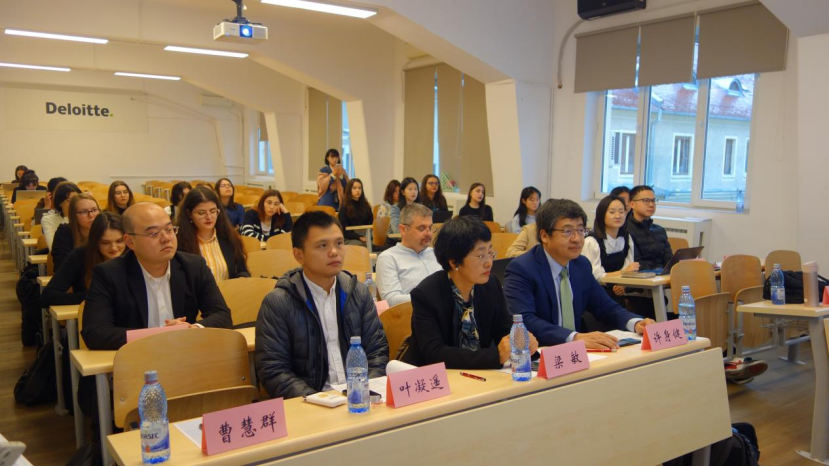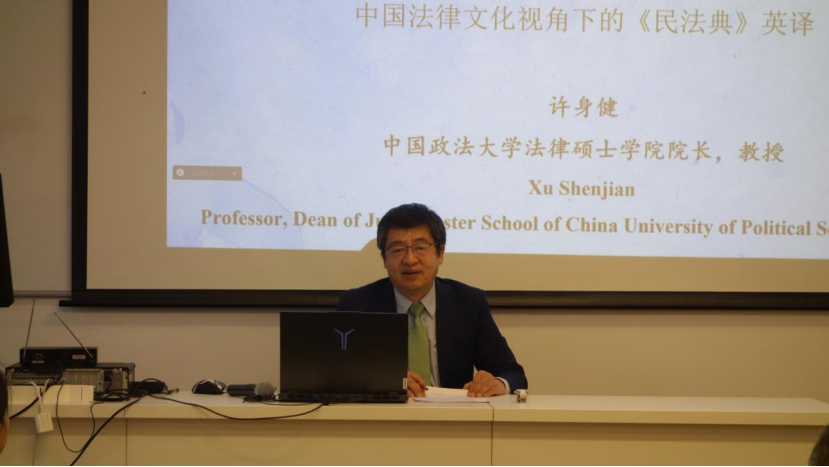On November 10, 2024, the Third Sino-Romanian Seminar on Translation and Cultural Communication was successfully held. This conference was jointly organized by the Confucius Institute at the University of Bucharest (a collaborative initiative of our university), the Chinese Language Department in the University of Bucharest, the School of Juris Master and School of Foreign Language in the China University of Political Science and Law (CUPL), with strong support from the Institute of Translation and Interpreting of the China Foreign Languages Publishing Administration and the School of European Languages and Cultures at Beijing Foreign Studies University (BFSU). Over 40 experts and scholars from China and Romania specializing in translation, cultural communication, and international Chinese education participated in the event both online and in person. Discussions focused on topics such as translator training, legal text translation, literary classics translation, international communication capacity building, and international Chinese education.

The opening ceremony was hosted by Ms. Yu Su, the Chinese Director of the Confucius Institute at the University of Bucharest. Keynote speakers included Professor Chunlong Lu, Vice President of CUPL, who reviewed the history of cultural exchanges between China and Romania, emphasizing the bridge-building role of translation in cultural mutual learning. He highlighted the seminar as a significant platform for promoting educational and cultural exchanges between the two nations. Professor Gang Zhao, Vice President of BFSU, underscored the importance of the conference being held during the 75th anniversary of diplomatic relations between China and Romania. He emphasized the crucial role of translation in fostering civilizational progress and addressed the opportunities and challenges posed by artificial intelligence in enhancing translation efficiency, quality, and translator training. Professor Shenjian Xu, Dean of the School of Juris Master, used the adage “Others are mirrors to oneself” to illustrate the importance of cultural exchange and mutual learning. He highlighted both the advantages and challenges of advancing technology for translation work and translator training. Luminița Bălan, Romanian Director of the Confucius Institute, emphasized that translation and cultural communication are increasingly developing in interdisciplinary directions, injecting new energy into the field.
Fei Wang, Deputy Director of the Institute of Translation and Interpreting, reviewed China’s historical development in translation and stressed the need to strengthen translator training and international communication capacities to match the country's global stature. Mugurel-Dan Zlotea, Associate Professor at the University of Bucharest, used Umberto Eco's novel The Name of the Rose to explore translators' balance between domestication and foreignization strategies, as well as the impact of cultural contexts on translation.
Dean Professor Shenjian Xu delivered a keynote speech titled The English Translation of the Civil Code from the Perspective of Chinese Legal Culture. He highlighted the Civil Code’s significance as a comprehensive legal document embodying traditional Chinese culture and outstanding legal traditions. The English translation of the Civil Code serves as a window into China’s rule of law and legal culture, reflecting the translator’s awareness of Chinese legal culture and the subjectivity of Chinese legal discourse.

At the sub-forum on "Translation and Cultural Communication," various scholars presented their research. Professor Xixiao Dong(BFSU) analyzed cultural differences in color terms between Chinese and Romanian and discussed translation strategies from a cognitive linguistics perspective. Professor Lihong Wang (Beijing Language and Culture University) advocated for an action-oriented empowerment model in translator education, incorporating cross-cultural responsibilities. Associate Professor Linan Tian (CUPL) discussed how CUPL's legal translation courses enhance translators' international perspectives, legal knowledge, and foreign-related legal expertise. Professor Jun Xu (CUPL) analyzed issues of misinterpretation and mistranslation in the English versions of The Analects. Associate Professor Yao Fu (CUPL) reexamined retranslation using multilingual versions of Voltaire’s Treatise on Tolerance. Andreea Chiriță, Lecturer at the University of Bucharest, explored the depiction of Qu Yuan on the Romanian cultural stage, reflecting Sino-Romanian cultural diplomacy in the early 1950s. Marius-Virgil Florea (Shanghai International Studies University) discussed translating the Chinese philosophical concept of “gewu” (investigating things) from Wang Yangming’s Instructions for Practical Living. Lecturer Xiaoyu Li (Beijing International Studies University) explored interdisciplinary innovations in language+ training models for multilingual education. Lecturer Fan Qiao (Xinjiang University of Political Science and Law) proposed translation strategies for different types of satire, emphasizing the integration of context, knowledge, and cultural information. Director Luminița Bălan (University of Bucharest) analyzed translation strategies in the English version of Yu Hua’s The Seventh Day.
At the sub-forums on International Chinese Education and Cultural Communication, Professor Yanli Zhang (Shanghai International Studies University) shared practices in teaching international students, including curriculum design and classroom integration. Associate Professor Chunxiang Song (CUPL) analyzed cross-cultural dialogue models in advanced Chinese reading and writing curricula. Lecturer Ming Liu (BFSU) discussed how Chinese social media platforms aid Central and Eastern European learners in deepening their understanding of Chinese culture. Maria Lacqua, a local teacher at the Yassy Euro-Asia School, highlighted the role of Confucius Classrooms in cultural exchanges. Ruihong Cao, a teacher at the Confucius Institute, proposed measures for improving local Chinese education. Yifan Wang, a teacher at the Confucius Institute, explored the relationship between cultural teaching beliefs and teaching practices. Di Fan, a teacher at the Confucius Institute, examined factors affecting Romanian teenagers’ accuracy in reading Chinese characters.
In closing remarks, Director Luminița Bălan expressed gratitude to the experts and scholars for their contributions. She emphasized the seminar’s role in advancing academic exchanges and collaboration between China and Romania in translation, cultural communication, and international Chinese education. Professor Qing Zhang, Dean of CUPL’s School of Foreign Languages, highlighted the importance of the seminar in fostering interdisciplinary discussions, addressing challenges, and enhancing the far-reaching influence of translation and cultural dissemination.
The conference has become a vital platform for Sino-Romanian cultural exchanges, significantly contributing to academic research, grassroots interactions, talent training, and institutional collaboration. As the third edition, its growing influence and role in promoting translation and international Chinese education in Central and Eastern Europe were highly acknowledged.
